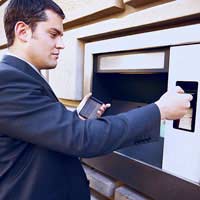Hidden Fees When Using Your Banking Services and Credit Card Abroad

You've booked an amazing last-minute bargain of a holiday. The hotel looks great, and not only have you got all the flights and transfers sorted, but you've also managed to find a fantastic yet inexpensive travel insurance package. Everything is set for a brilliantly frugal holiday experience. That is, until you arrive at your destination and start using your bank services or credit card.
Banking and credit card customers are often no aware of the hidden fees that they can incur when travelling abroad. The rates and fees applied in the UK can vary dramatically as soon as one steps onto foreign soil. Knowing and understanding where these hidden fees and charges can apply, and how they can be avoided will make for a more enjoyable foreign venture. This article checks out the commonest hidden fees associated with banking and credit card use abroad.
ATM Hidden Fees
Using an ATM in the UK rarely costs you an additional withdrawal fee. Only the standalone ATMS found in shops and pubs levy an extra charge, with the true 'hole in the wall' remaining a free service. However, you shouldn't assume that using an ATM abroad would also be free. Using your credit card or debit card to withdraw cash abroad could prove to be much more costly than you might have imagined.
It is largely thought that because penalty fees on overdraft facilities and late fees have recently been capped, credit card companies and banks have tried pushing up their fees in other service areas. One such area is the hidden fee applied to your card or bank balance when you use an ATM in a foreign country. It can cost the average consumer around 1.5 -2% of the total withdrawal amount just to get the money out of the machine with their debit card. Some banks will charge a flat rate of around £1.50, whilst others will offer this service for free.
Withdrawing cash using your credit card will prove more costly than a debit card. Not only with cash purchases not apply to most interest free periods, but you will also end up paying the APR on the cash advances, as well as the withdrawal fee. Most credit card withdrawal fees cost around 2.5-3% of the total amount withdrawn, so if you withdraw around £1000 on your credit card whilst on holiday, you would end up spending around £70-75 in withdrawal fees alone.
It is expected that these rates could rise in the future to as much as 6% for withdrawals. This massive leap could leave many customers paying a premium for this option, making other alternatives such as traveller's cheques or prepaid travel cards a more viable option.
Loading Fees
But the charges don't end there - both debit cards and credit cards are usually subject to another additional hidden fee often referred to as 'loading fees'. This fee is also known as an 'exchange rate conversion fee', 'adjustment charge' or 'administration fee'. It applies to both cash withdrawals and purchases made in a foreign country, and basically is the fee applied to convert the local currency into GBP sterling. The currency rate that the banks or credit card providers use is usually poor when compared to other competitive currency exchange rates. This is usually down to the fact that the currency rate includes the loading fee, something will not become apparent until your statement arrives later on.
Sometimes a shop or restaurant will offer you the chance to pay for your goods or services in sterling, a service known as dynamic currency conversion. This is not a cost effective way of paying, as an additional loading fee can be applied, costing you around 3% more than a credit or debit card conversion fee.
The best advice is to take a range of different payment methods abroad with you. A debit or credit card is a good back-up plan, and a small amount of local currency will mean that you'll avoid extra charges on smaller purchases. There are many ways to carry money with you abroad, it's just a case of researching which rates and methods are best for your circumstances.








